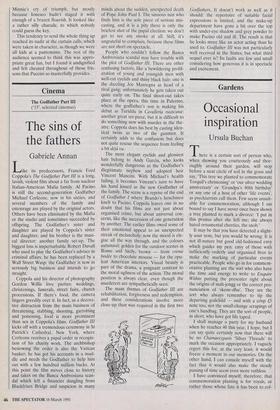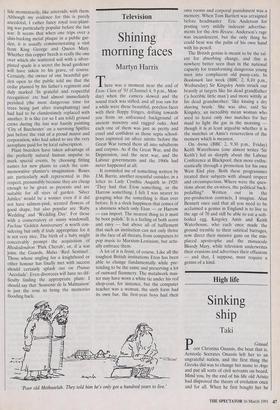Gardens
Occasional inspiration
Ursula Buchan
There is a certain sort of person who, when showing you courteously and thor- oughly around their garden, will stop before a neat circle of soil in the grass and say, 'This tree we planted to commemorate Torquil's christening' or 'our silver wedding anniversary' or 'Grandpa's 80th birthday' or any one of a host of other 'life events', as psychiatrists call them. Few seem unsuit- able for commemoration, although I am bound to say I have never once been shown a tree planted to mark a divorce: 'I put in this prunus after she left me; she always hated ornamental cherries, the snob.'
It may be that you have detected a slight- ly sour note, but you would be wrong. It is not ill-nature but good old-fashioned envy which guides my pen: envy of those with sufficiently orderly and organised lives to make the marking of particular events practicable. People who go in for commem- orative planting are the sort who also have the time and energy to write to Enquire Within putting the presenter right about the origins of mah-jongg or the correct pro- nunciation of `skene-dhu'. They are the sort who always remember to tip the departing godchild — and with a crisp £5 note too, not the small-change scrapings of one's handbag. They are the sort of people, in short, who have got life taped.
I shall manage a party for my husband when he reaches 40 this year, I hope, but I can say quite certainly now that there will be no Chamaecyparis 'Silver Threads' to mark the occasion appropriately. I vaguely regret this for, at the very least, it would freeze a moment in our memories. On the other hand, I can console myself with the fact that it would also make the steady passing of time seem even more ruthless.
I have convinced myself, therefore, that commemoration planting is for royals, or rather those whose fate it has been to col-
fide momentarily, like asteroids, with them. Although my evidence for this is purely anecdotal, I rather fancy royal tree-plant- ing was particularly popular before the last war. It seems that when one trips over a shin-barking metal plaque in a public gar- den, it is usually commemorating a visit from King George and Queen Mary. Whether this copper beech is really the one over which she scattered soil with a silver- plated spade is a secret the head gardener will have taken to his grave, of course. Certainly, the owner of one beautiful gar- den open to the public told me that the cedar planted by his father's regiment and duly marked 'In grateful and respectful recognition' etc had almost immediately perished (the most dangerous time for trees being just after transplanting) and had had to be clandestinely replaced with another. It is like (or so I am told) ground crews during the last war hastily painting 'City of Barchester' on a surviving Spitfire just before the visit of a proud mayor and corporation, who had asked to see the very aeroplane paid for by local subscription. Plant breeders have taken advantage of the perfectly natural human impulse to mark special events, by choosing fitting names for new plants to catch the com- memorative planter's imagination. Roses are particularly well represented in this respect, presumably because they are cheap enough to be given as presents and are suitable for all sizes of garden. 'Silver Jubilee' would be a winner even if it did not have salmon-pink, scented flowers of good shape, but also popular are 'Ruby Wedding' and 'Wedding Day'. For those with a conservatory or sunny windowsill, Fuchsia 'Golden Anniversary' is worth con- sidering but only if truly appropriate for it is not very nice. The birth of a baby might conceivably prompt the acquisition of Rhododendron 'Pink Cherub', or, if a son joins the Guards, Ma/us 'Red Sentinel'. Those whose angling for a knighthood or other honour has finally met with success should certainly splash out on Prunus 'Accolade'. Even divorcees will have no dif- ficulty finding the appropriate plant: I should say that 'Souvenir de la Malmaison' is just the rose to bring the memories flooding back.
'Poor old Methuselah. They told him he's only got a hundred years to live.'



























































 Previous page
Previous page